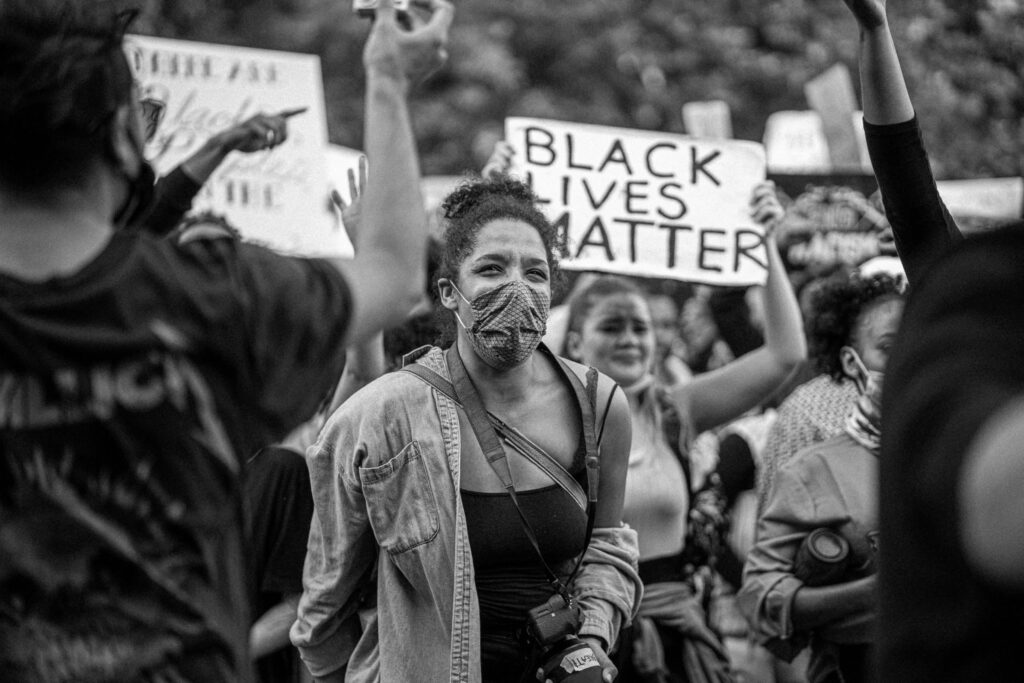If we didn’t know before COVID-19, we certainly know now! Health and social constitutions around the world are in crisis. Looking at the UK specifically, the rapid dismantling of the UK’s NHS, privatisation and neoliberal policies are encouraged and employed. Procedures are being established to bring health and social care services together into much more prominent, privately-run conglomerates. This is especially prevalent in the USA.
Let’s just quickly look at healthcare in the USA, which is arguably the most capitalist country globally. Firstly, COVID-19 has run rampant there; there have been over 6 million cases over there! But I don’t even want to look at that because there were underlying issues prior! In the US alone, 20 – 40 thousand deaths occured a year, solely due to the lack of health insurance/care. There is increasing evidence supporting the existence of a link between income inequalities and health outcomes. Now, if you asked me, I would argue that the neoliberal view of health being a commodity is archaic, futile, and frankly, inhumane.

However, I don’t want to be making such strong claims without backing them up! I wouldn’t be a very good sociologist if I did that now, would I? So, for this post, I intend to show how neoliberalism is a significant factor in the relationship between social inequality and health.
What is neoliberalism?
Ok, I know I don’t need to teach my readers how to suck eggs; you’re an intelligent bunch! But, to look at neoliberalism’s impact on social inequality and health, we need to know what neoliberalism is. Neoliberalism is defined as an adjusted form of liberalism that encourages free-market capitalism. Matt Sparke understood neoliberalism to be an approach to governing capitalism. It emphasises liberalising markets and making market competition the basis of economic coordination, social distribution, and personal motivation.
Sue McGregor conceptualises neoliberalism as having three principles: individualism, free-market via privatisation and deregulation, and decentralisation. We can make the explicit assumption that a neoliberal person will favour themselves over others. So basically, you’re so vain, I bet you think this post is about you!
Joking aside, this, in turn, helps society become much more individualistic. The aim is to become a free market and have a laissez-faire economic system. Ok, I’m almost finished; I promise I don’t want to bore you with a business lesson. So, finally, the vital central policies of neoliberalism are:
The Robin Hood index
Capitalist countries such as Singapore, Portugal, the UK and the US, are among the unequal countries. Not much of a surprise, is it? In these countries, inequalities in the distribution of wealth are incredibly severe. For example, 1% of the world’s population owns more than half the world’s wealth. Come on, Bill and Jeff, give the rest of us some money, please! When we look at these inequalities closer, is it surprising that there is an unambiguous relationship between social inequality and health?
The Robin Hood index is conceptually one of the most uncomplicated measures of inequality. Still, it’s beneficial when looking at inequality. It shows the proportion of money needed to be transferred from the rich to the poor to achieve equality. When using this index, Kawachi, Kennedy and Glass found that in terms of the poverty rate and the median income, increasing inequality by 1% correlated with excess mortality of 21.7 deaths in America. Income inequality at a county level severely corresponds with population rates of mortality. There is a plethora of research identifying that the relationship between social inequality and health is unmistakable. But let’s look at this a bit more in-depth.

Material deprivation
Neoliberals are not very concerned about income inequality, shock horror. They view it as either a positive virtue or an inevitability. Consequently, neoliberalism promotes the gap between the rich and the poor. Therefore, due to the worsening of income inequality, material deprivation is a significant contributor to health issues for the lower end of the social spectrum. Looking at the Office of National Statistics reports, 445 people died from malnutrition in 2017. Unfortunately, this is their most recently published data, but deaths from malnutrition have been on the rise since 2014. In the USA, 1 out of every 7 US citizens needs to visit food banks to survive. Despite that, the neoliberal world produces 17% more food per person today than 30 years ago. Food waste in 2018 was enough to feed the world’s hungry four times over!
Now, if that doesn’t boil your blood, this should! It is estimated that 15 million people worldwide die each year from preventable poverty, of whom 11 million are children under the age of 5. To bring this closer to home, The Guardian showed that nearly one in five UK children under the age of 15 suffers from food insecurity. This means their family lacks secure access to sufficient, safe and nutritious food. Now, for a supposedly top world country, these statistics are appalling. But unfortunately, income inequality in the neoliberal world does not just affect access to nutritious food. The conditions of a person’s home can be very influential on health.
“9,700 deaths a year are attributable to living in a cold home”
Homes in working-class areas help spread infectious diseases and mortality rates through overcrowding, dampness, and poor ventilation. In 1982, a study discovered that a disproportionate number of infant deaths happen due to households lacking basic amenities or people living in overcrowded environments. Well, this was almost 40 years ago; surely it has gotten better? Today, 9,700 deaths a year are attributable to the avoidable circumstances of living in a cold home. This is about the same as the number of people who die from breast or prostate cancer yearly, to add some perspective. These deaths are entirely avoidable!
Neoliberal reformation
As I said earlier, neoliberalism supports the privatisation of public services, such as the NHS. In the UK, neoliberal policies are coming to fruition. In 2006, 2.8% of NHS spending went to private providers, whereas today, this is around 22%. Now, jumping across the Atlantic Ocean to our American cousins, healthcare is a commodity bought on the market paid through by insurance. However, the number of uninsured people is increasing, considering in 2018, 27.9 million people lacked health coverage, an increase of 1.2 million from 2016. It is unequivocal that the privatisation of healthcare intensifies the gap between rich and poor. David Himmelstein and colleagues claimed that medical issues caused 62.1% of bankruptcies in the US.
Neoliberalism and its policies have a considerable effect on the lower social classes in terms of material deprivation, which creates shocking health and social environment.
Diet and habits
As a result of neoliberal reformation, the UK government paradoxically invited companies, such as McDonald’s, KFC and Pepsi to help devise its food policies. For some context, in 2010, fast food companies were invited by the Department of Health to help write government policy on obesity, alcohol and diet-related disease. Now, I’ve seen Super Size Me, and I don’t think this was the smartest move! The average meal at McDonald’s has 1,500 calories, which is the recommended daily calorie intake for some people. EASO stated that obesity is the fifth leading risk for global deaths. At least 2.8 million adults die each year due to being overweight or obese!. In terms of social class in the capitalist structure, the increase in those obese is most prevalent in manual working social classes.

Brian Houle, over at PRB, discovered that those from working-poor households who had lower-status jobs were at increased obesity risk compared with the higher classes. Although, many argue ignorance is why obesity is a greater risk to the working class. But, I’d say this is an ignorant argument. Families in receipt of low income are aware of what constitutes a healthy diet. Still, they are unable to afford such a diet. Can you blame them when a double bacon cheeseburger is £2.00 at Maccies!
Smoking
Likewise, the same social-class trends are apparent in smoking, with smoking being more prevalent in manual social classes. The NHS conducted a study in 2009, which showed men in the lowest social class group had the highest rate of smoking, and men in the highest social class group had the lowest rate. Tobacco kills more than 8 million people each year. More than 7 million of those deaths result from direct tobacco use. At the same time, around 1.2 million are the result of non-smokers being exposed to second-hand smoke. Many argue that the lower class smoke to relieve stress caused by the fast-paced neoliberal lifestyle.
Psychological well-being
Neoliberalism affects not only physical health but also psychological well-being. The US, which has the highest income inequality, have 1 in 5 people with mental illness. Neoliberalism affects mental health due to the social circumstances, economic conditions and environmental surroundings of life in the low end of social class. These elements are viewed as being pivotal in the clarification of increased rates of psychiatric illness. Stress in the working class environment most often arises from structural economic factors over which individuals have little control. It is indisputable that double jeopardy is created through neoliberalism conditions of economic and social deprivation. The stress caused by these conditions tends to lead to severe mental health issues, for instance, depression.
In neoliberal societies, and with its emphasis on individual success, many people desire constant advancement. The constant striving for success in the neoliberal world can cause stress and severe health issues, especially for those lower in social stratification. Oliver James coined the idea of an “affluenza virus”. Symptoms are described as: placing a high value on acquiring money and possessions, looking good in others’ eyes of others, and wanting to be famous. James affirms that this “virus” gives a greater risk of depression, anxiety, and substance and personality abuse. Lower-class individuals cannot as quickly achieve their ambitious goals and climb the neoliberal system’s social ladder. Thus in many cases, they tend to turn towards illegal drugs to counteract the sense of failure. This is proven that countries with the most significant income inequality have the greatest drug use index, especially alcohol.

Socialism and healthcare
So can we agree with the argument: countless neoliberal policies and principles factor into the relationship of social inequality and health? Many scholars have published methods that could alleviate this relationship. According to Vicente Navarro’s study, contrary to the dominant ideology, socialism and socialist forces can better improve health conditions than have capitalism and capitalist powers. In 1955 Cuba’s life expectancy was 59.5. Yet, in 1985, its expectancy was 75, the highest in all the Latin American countries. Also, similar to the US’s life expectancy of 75.4 years in 1985. Furthermore, the under-five mortality rate per 1000 births dropped from 95 to 19 in Cuba between 1960 and 1985, thus having the lowest infant mortality rate in Latin America.
Hugh Lena discovered that, in general, high levels of democracy and strong left-wing regimes are associated with positive health outcomes. On the other hand, strong right-wing governments have populations with lower life expectancies and higher levels of various mortality measures. Now, without sounding too much like Karl Marx, it’s evident that socialism provides a much better base to mitigate these inequalities. But a country such as the UK cannot suddenly change to socialism when capitalism is so ingrained within its entire structure. Without a socialist revolution, of course!

Socialist policies
Well, actually, in the short term, we can certainly adhere to more socialist policies. Three countries that have benefitted from having a social-democratic majority government are Sweden, Norway, and Denmark. These countries have the best health and lowest income inequality. One of the Swedish Social Democratic party central policies was to completely transform the organisation of bourgeois society and bring about the social liberation of the working class. The fact these countries have the lowest Gini coefficient and the highest life expectancy identifies how social policy can reduce inequality and increase health.
Finally…
With our health being a constant talking point in the news today, it’s essential to analyse how our political ideology influences it. Neoliberalism undoubtedly is a significant factor in the relationship between social inequality and health status. Neoliberals’ acceptance of the ever-increasing gap between rich and poor intensifies health issues at the lower end of the social spectrum. Through the malnourishment of children and inhospitable housing environments, it seems very apparent that many neoliberals are willing to turn a blind eye as long as there is profit. A change in social policy must ensue, and social-democratic views must be embedded into these societies to reduce these thriving inequalities. Unless, of course, we do push for that revolution? Marx would be so pleased!


